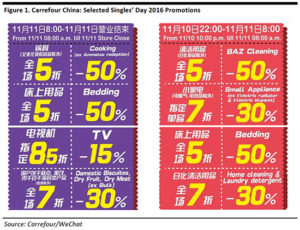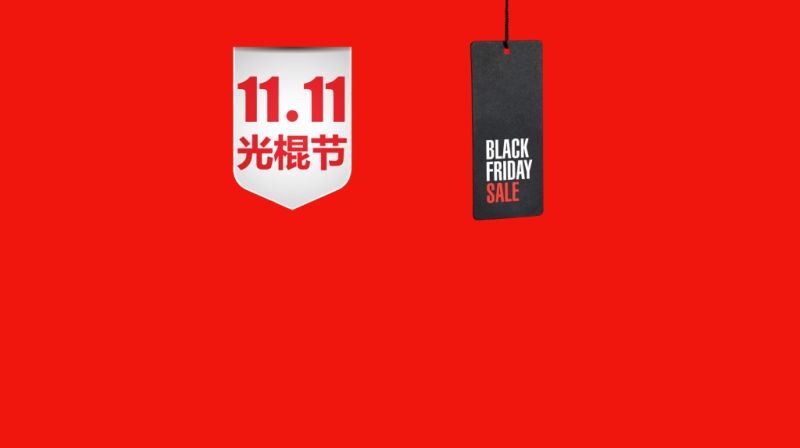Singles’ Day vs. Black Friday: how do they compare to each other?
Singles’ Day vs. Black Friday. The Christmas holiday shopping season is here! After the Double Eleven shopping festival, Black Friday took place last Friday. Both events have broke records, but how do they compare to each other?
Looking at the figures, Singles’ Day achieved an overwhelming victory over the other shopping festivals
“Better than the American Black Friday” according to the French newspaper Le Monde. “Much like Black Friday and Cyber Monday only bigger,” as Forbes puts it. More radical, the British newspaper The Telegraph writes “Forget tiny little Black Friday” and “Singles Day laughs in the face of Black Friday.”
It is a fact: Singles’ Day, also called Double Eleven or 11.11 (as it takes place every year on November 11th) becomes the world’s biggest online shopping day of the year. In 2016, total sales on 11.11 reached a record of USD 25.57 billion, among which Alibaba achieved USD 17.49 billion sales through its online marketplaces Tmall and Taobao.
Singles’ Day dwarfs both Black Friday (the shopping festival that traditionally takes place offline on the Friday right after the American Thanksgiving) and Cyber Monday (Black Friday’s online equivalent on Monday following Thanksgiving). This year, USD 3.34 billion sales were realized online on Black Friday and USD 3.39 billion USD during Cyber Monday. A simple calculation shows that 11.11 sales are considerably bigger than those of Black Friday and Cyber Monday combined. Alibaba’s sales on 11.11 are even more than the double of the sum of these two Western shopping festivals sales.
From the global standpoint, this hegemony is questionable
Let’s look away from the sales figures to compare Black Friday vs. Singles’ Day.
Singles’ Day vs. Black Friday: Geographical expansion
Black Friday originated from the United States and is the biggest shopping event in the Anglo-American world. It is now common knowledge that Black Friday is the highest sales day in the United Kingdom. In European countries, it is a still-new shopping event, but it grows in scale every year. Black Friday was introduced in Norway in 2010; in Germany, Austria, and Switzerland in 2013; in Ireland, Denmark, Finland, Sweden, and France in 2014; in the Netherlands in 2015; in Ukraine this year. In 2016 Black Friday, 970 orders were placed each minute on Amazon France, which sold a total of 1.4 million products and achieved a 40% growth from last year. Black Friday is also known on the African continent, in India, and has entered the Chinese market in 2014 thanks to cross-border e-commerce platforms like Amazon and ymatou.com. The founder and CEO of ymatou.com Zeng Bibo estimated that Black Friday might take over 30 to 40% market sales of 11.11 shopping festival.
Can Singles’ Day boast about such a significant presence in the world? For now, the answer to this question is ‘no.’ Singles’ Day shopping festival is first and foremost a Chinese event, little known in the West except for retailers and shopping addicts. Given the recent increase in awareness of and participation in Black Friday, it might be difficult for Singles’ Day to grab Europeans’ interest in such proximity. However, Western retailers increasingly participate in 11.11 shopping festival through their presence on Tmall or Tmall Global. For example, the German cash-and-carry chain Metro took part in the 2015 festival and sold 2 million liters of imported milk. French grocery Carrefour is not on Tmall but promoted its in-store offers for 11.11 shopping festival on WeChat.

Carrefour China WeChat discount coupons for 2016 Singles’ Day
Singles’ Day vs. Black Friday: History, tradition, and meaning
Singles’ Day is an “anti-Valentine’s” celebration for single people, also known in China as “bare sticks holiday” (Guanggun Jie, 光棍节) because the date is written one-one-one-one. Launched by Nanjing University students in 1993, Alibaba turned it into a massive online shopping event in 2009. 11.11 is becoming a mature shopping festival since Chinese consumers already have their shopping habits for this event. However, the festival enjoys popularity mainly among young Chinese: 72% of 11.11 buyers are below 35 years old.
While Singles’ Day is a young event that has no historical background, Black Friday is directly related to Thanksgiving, one of the major traditional American festivals. Black Friday takes place the day after Thanksgiving and people traditionally go shopping with family. In some states in the US like Arkansas, California or Florida, “the Day after Thanksgiving” is even an official public holidays for state government employees, and many employers give their employees the day off as part of the Thanksgiving holiday weekend.
Even though Black Friday’s origins are not clear and that on the other hand, 11.11 reflects the genuine insight that single people want to celebrate and show pride of their status, there is no doubt that Black Friday is more deeply rooted in the American culture than 11.11 is in the Chinese culture.
Can “Alibaba’s Singles’ Day shopping festival” belong to the world?
Alibaba launched Singles’ Day shopping festival in 2009 and went further when it trademarked “Singles’ Day” in 2012 to protect its concept from competitors like JD.com or Suning.com. Therefore, the event is firmly tightened to Alibaba: “Singles’ Day shopping festival is rooted in the Chinese popular culture only through a company [Alibaba], and this is accepted,” notes Kevin Gentle, head of the digital strategy department at Labbrand.
Will Alibaba be able to impose its 11.11 shopping festival to the rest of the world? In Europe, the date of the event rises as a first obstacle. In Poland, November 11 is Polish Independence Day, a public holiday with public ceremonies and church services. In France, Belgium, Ireland and the UK, it is Remembrance Day, and even a public holiday in France and Belgium. “It would be incredibly distasteful to run a shopping event in Britain during Remembrance services,” says a British retailer.
At the extreme, what would happen if the Alibaba e-commerce empire lost power, facing competition on the Chinese market in a context of economic slowdown? Can Singles’ Day shopping festival exist in the global e-commerce environment if the giant Alibaba does not back it?
Singles’ Day vs. Black Friday: How Singles’ Day expands in the world

Tmall Global advertisement for “11.11 Global Shopping Festival 2016”
Alibaba’s Singles Day 2016 edition was called “11.11 Global Shopping Festival 2016”, a sign of the company’s strategy to expand globally to limit its reliance on the Mainland Chinese market.
This year, Alibaba targeted Taiwan and Hong Kong for the first time. It also went further than involving foreign brands on Tmall or Tmall Global to enable them to sell to Chinese consumers. AliExpress, the overseas Taobao that sells Chinese products to foreign-located shoppers, also took part in 2016 Singles’ Day. 35.78 million orders from 230 countries were placed on the platform. “Russia is among the top three foreign markets of AliExpress, alongside the USA and Spain,” according to Mark Zavadsky, Chief Representative of AliExpress.





